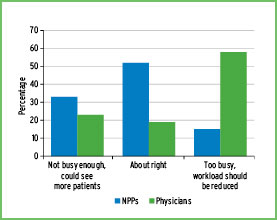Sep 07, 2011
ASCO recently released the results of the ASCO Study of Collaborative Practice Arrangements, funded by Susan G. Komen for the Cure®. The study—also referred to as the Workforce Collaborative Practice Study—was initiated and designed by ASCO’s Workforce Advisory  Group to address impending workforce shortages in oncology by exploring the expanded use of non-physician practitioners (NPPs), primarily nurse practitioners and physician assistants, in oncology practice settings. The study examined several differentcollaborative practice models:
Group to address impending workforce shortages in oncology by exploring the expanded use of non-physician practitioners (NPPs), primarily nurse practitioners and physician assistants, in oncology practice settings. The study examined several differentcollaborative practice models:
According to the study, “Patients were aware when care was provided by an NPP and were very satisfied with all aspects of the collaborative care that they received. The integration of non-physician practitioners into oncology practice offers a reliable means to address increased demand for oncology services without adding physicians.”
Study authors include Elaine L. Towle, CMPE, and Thomas R. Barr, MBA, both of Oncology Metrics, a division of Altos Solutions; and the ASCO Workforce Advisory Group: Michael Goldstein, MD, Chair; Dean F. Bajorin, MD, Co-Chair; Kathleen W. Beekman, MD; Patrick A. Grusenmeyer, ScD, FACHE; Michael P. Kosty, MD, FACP; R. Steven Paulson, MD; Gladys I. Rodriguez, MD; and Stephanie F. Williams, MD.
 Group to address impending workforce shortages in oncology by exploring the expanded use of non-physician practitioners (NPPs), primarily nurse practitioners and physician assistants, in oncology practice settings. The study examined several differentcollaborative practice models:
Group to address impending workforce shortages in oncology by exploring the expanded use of non-physician practitioners (NPPs), primarily nurse practitioners and physician assistants, in oncology practice settings. The study examined several differentcollaborative practice models:- Incident-to practice model (ITPM)—NPPs see patients independent of the physician, but the physician is generally present onsite
- Shared practice model (SPM)—NPPs see patients in conjunction withphysician
- Independent practice model (IPM)—NPPs see patients completely independent of an oncologist
According to the study, “Patients were aware when care was provided by an NPP and were very satisfied with all aspects of the collaborative care that they received. The integration of non-physician practitioners into oncology practice offers a reliable means to address increased demand for oncology services without adding physicians.”
Study authors include Elaine L. Towle, CMPE, and Thomas R. Barr, MBA, both of Oncology Metrics, a division of Altos Solutions; and the ASCO Workforce Advisory Group: Michael Goldstein, MD, Chair; Dean F. Bajorin, MD, Co-Chair; Kathleen W. Beekman, MD; Patrick A. Grusenmeyer, ScD, FACHE; Michael P. Kosty, MD, FACP; R. Steven Paulson, MD; Gladys I. Rodriguez, MD; and Stephanie F. Williams, MD.
